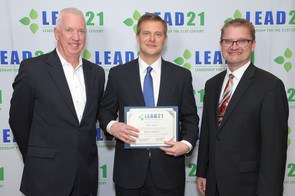Posted: April 14, 2020
Department of Animal Science's Burt Staniar completed the LEAD21 program, a leadership-development initiative.

Burt Staniar, center, displays his LEAD21 certificate, flanked by LEAD21 program chair Mike O'Neill, from the University of Connecticut, left, and LEAD21 board chair Brian Kowalkowski, from the College of Menominee Nation. Image courtesy of LEAD21
UNIVERSITY PARK, Pa. - Burt Staniar, associate professor of equine science in Penn State's College of Agricultural Sciences, recently was one of 90 individuals completing the LEAD21 program, a leadership-development initiative affiliated with the Association of Public and Land-grant Universities.
This group of distinguished individuals represents land-grant institutions and their strategic partners from across the nation. Over the past year, participants have met regularly with their peers, both in-person and virtually, to enhance their personal leadership capacity.
The graduation was held in February at the culmination of the third in-person session, which focused on organizational leadership through collaboration, communication and leading change.
Staniar holds a bachelor's degree in biology from the University of Richmond and earned master's and doctoral degrees in animal science from Virginia Tech. He spent five years as a postdoctoral associate and then assistant professor at Virginia Tech before joining the Penn State faculty in 2007.
Staniar's research focuses on how nutrition and management influence metabolic regulation in horses. He also is an adviser for the Penn State Equine Research Team, a group of undergraduate students interested in using the scientific method to answer questions regarding the health and performance of the horse.
He is a member of the Equine Science Society, the American Society of Animal Science, the Comparative Nutrition Society and the Pennsylvania Equine Council.
The primary purpose of LEAD21 is to develop leaders in land-grant institutions and their strategic partners who link research, academics and extension. The program is aimed at enabling participants to lead more effectively in an increasingly complex environment, either in their current position or in future leadership positions.
Goals of LEAD21 are to enhance application of skills and knowledge across a set of nine leadership competencies; to develop a network of peer leaders to enhance personal leadership practice, collaboration and diversity of perspective; and to develop and implement an individual's leadership development process.
More information about LEAD21 can be found online at http://lead-21.org/.

